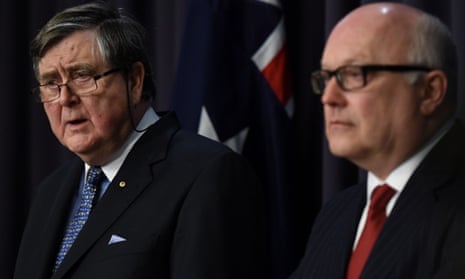The attorney general, George Brandis, would decide who would be prosecuted under a controversial new provision in national security legislation designed to head off a homegrown Chelsea Manning or Edward Snowden.
In the last parliamentary sitting fortnight, Brandis brought forward a package of reforms to strengthen Australia’s national security framework and expand the surveillance footprint. Those reforms are now the subject of an inquiry by the joint parliamentary committee on intelligence and security (JPCIS).
The reforms proposed by the Abbott government are intended to make it easier for the peak spy agency, Asio, to monitor computers and computer networks. They also contain provisions which create a new offence punishable by five years in jail for “any person” who discloses information relating to “special intelligence operations”.
The broad wording in the proposed anti-leaking provision has prompted some leading criminal lawyers, the journalists’ union and media companies to warn the change could criminalise not only the initial disclosure, but any subsequent reporting of Snowden-style intelligence leaks.
An explanatory submission by Brandis’s department to the new JPCIS inquiry makes it plain that it will be the attorney general who decides who will be prosecuted under the new provisions.
The department presents the proposed ministerial authority to the committee as an important safeguard in the new package. “The offences are subject to a number of safeguards to ensure that their application is limited to serious instances of wrongdoing. For example, there is a requirement that the attorney general must consent to all prosecutions,” it says.
Brandis and the head of Asio, David Irvine, have thus far attempted to deadbat arguments that the broadly drafted provision could potentially catch publication as well as the initial disclosure. Both have argued it is not the “intention” of the new clause to target media outlets.
But various senior players in the Abbott government have been intensely critical of both the Snowden disclosures and their subsequent reporting.
The prime minister criticised the ABC for working with Guardian Australia on one of the key domestic Snowden disclosures, the revelation that Australian intelligence in 2009 targeted the phones of the Indonesian president and his inner circle for surveillance.
Despite the fact the Guardian has worked with a number of other news outlets on the Snowden disclosures, and the ABC routinely works with commercial media companies on joint investigations, Abbott characterised the broadcast of the politically sensitive material as the ABC working as “an advertising agent for the Guardian” and “touting for a leftwing British newspaper”.
Recently, the prime minister said news that endangered national security “shouldn’t be fit to print”.
The department is clear in its submission to the JPCIS that the new provisions are intended to strengthen the capacity of the government and agencies to deal with unauthorised disclosures by intelligence insiders.
Snowden was employed as a contractor to the National Security Agency before blowing the whistle on the massive US digital surveillance apparatus. Asio raised explicitly the security risks associated with a homegrown Snowden in its annual report to parliament tabled last October.
“Espionage activity extends to the threat of a trusted insider,” the spy agency said in its annual report.
“International high-profile cases this year serve as a reminder of the risk that someone with legitimate access to classified systems may deliberately disclose or sell protected information. Though not of the same scope or scale, there have been a number of cases in Australia of unauthorised removal, dissemination or mishandling of sensitive material by trusted employees.”
Brandis’s department has told the JPCIS that the reforms being proposed are necessary to address gaps identified in the coverage of existing offences.
“In particular, the reforms will strengthen Australia’s capability to manage the risk of unauthorised disclosures by so-called trusted insiders. These are persons who have access to intelligence-related information in the course of their official duties and who disclose or otherwise compromise it without authority,” the department tells the intelligence committee.
The department says members of the intelligence community occupy a unique position of trust, and are made aware of their legal obligations regarding the handling of classified documents: “Given this, there is a strong and legitimate expectation that these persons will handle that information lawfully at all times.”
The department says the new provisions do not prevent intelligence insiders making “public interest” disclosures to an oversight body, such as the inspector general of intelligence and security.
Labor, while broadly supporting the package, has indicated the government will need to redraft the provision if it criminalises publication of intelligence disclosures.
In Sydney on Thursday, the Labor leader, Bill Shorten, also raised concerns about the costs associated with another looming security reform: the imposition of a new system forcing phone companies and ISPs to retain the personal data of Australians for two years or more.
ISP iinet has warned recently that mandatory data retention could lead to Australian consumers facing rises in charges of more than $100 a year.
Shorten said that could amount to a new surveillance “tax” on consumers. Voters were already dealing with a rise in the indexation of fuel excise and a “tax” on GP visits. Shorten said a surveillance “tax” would be the “third leg of the liefecta” from the Abbott government.

Comments (…)
Sign in or create your Guardian account to join the discussion